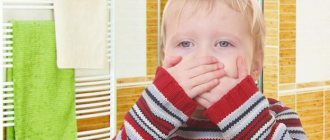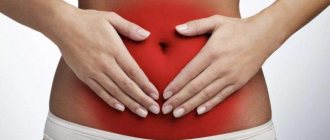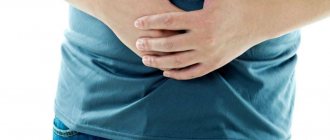Often, foam in a child’s stool is nothing more than increased gas formation. Most often, this symptom appears in infants, since their digestive system is not yet completely perfect.
In older children, foaming that began suddenly indicates a malfunction of the gastrointestinal tract. Parents should observe the color of the discharge, its frequency, impurities in the stool and the presence of additional symptoms in the baby.
If foam in the stool is accompanied by a high temperature, and the child looks sick, you should show him to your local pediatrician or call an ambulance.
Main reasons
Gas formation can bother children of any age.
Sometimes it is caused by a lack of balanced nutrition. In some cases, this condition is caused by microorganisms or allergens. Oddly enough, such a symptom poses the greatest danger in a child whose digestive system has long been debugged. In infants, diarrhea with foam is a more common and natural occurrence. But this does not mean that the child does not need to be shown to a specialist.
There are many reasons why gas bubbles may be observed in the stool.
In infants
The cause of diarrhea in a newborn baby depends on the type of feeding. If he feeds on mother's milk, foam can be observed at first, without being a pathology. This becomes a consequence of adaptation to certain substances of products that enter the child’s stomach along with milk. This happens especially often if the mother has eaten stale or unhealthy food.
Which foods may cause foaming in the stool:
- various multi-component salads (for example, Olivier salad or vinaigrette) - all ingredients are gas-forming;
- fast food;
- allergens (chocolate, citrus fruits, red vegetables and fruits, cow's milk protein, gluten);
- consumption of yeast (bread, baked goods, kvass or beer).
To prevent stomach problems in a baby, a nursing mother must adhere to a certain diet that excludes all prohibited foods. As a rule, after several feedings the baby’s stool gradually improves.
Other causes of foamy diarrhea in a child:
Lactase deficiency
It is a congenital abnormality of the child's body, which is expressed in the absence of an enzyme called lactase. Due to this, the baby’s digestive system cannot absorb milk sugar.
If only the stool is disturbed, nutritional correction is sufficient for full treatment. In rare cases, foamy diarrhea is accompanied by frequent regurgitation, abdominal pain and weight loss. Such symptoms require the use of medications.
Dysbacteriosis
In the first minutes after birth, the body of a newborn baby is completely sterile. Every minute the baby begins to encounter new microbes that settle on his skin and enter the body. The problem is solved by early breastfeeding, thanks to which the necessary bacteria enter the digestive tract along with colostrum.
Very often, children who are bottle-fed from birth suffer from dysbacteriosis. In this case, the intestines are forced to colonize with beneficial microorganisms with the help of medications.
Food allergies
It can occur in infants with any type of feeding. Those babies who eat mother's milk receive allergens from her diet along with it. Formula-fed babies sometimes react with foamy stools when new formula is introduced.
This may result in an allergy to any medications used to treat the child or nursing mother. Foaming is also very often observed during early complementary feeding, especially with unsuitable foods.
Intestinal infection
The presence of any pathogenic microorganisms in the gastrointestinal tract necessarily affects the nature of the feces. Infectious diseases can be distinguished by a number of signs that do not appear in other cases. The baby's temperature rises, he cries a lot, and vomits frequently.
If stool appears more than 10 times a day and is accompanied by clots of mucus or blood, you should immediately consult a doctor.
Even if such a symptom is not accompanied by any additional manifestations, it is recommended to tell your doctor about it. Lack of treatment can lead to chronic disorders of the digestive system, which will be difficult to get rid of in the future.
In adult babies
Loose, foamy stools in a child over 2-3 years old often indicate an infectious disease. As a rule, in older children, foam in the stool is not the only symptom in the presence of any pathologies.
Main reasons:
- Intestinal infection. It is necessary to monitor the child’s condition when he starts going to kindergarten. Sometimes there is a risk of infection with salmonella or staphylococcal bacillus. Poisoning is manifested by diarrhea, vomiting, and symptoms of general intoxication. With such signs, the baby is hospitalized in a hospital for examination and treatment.
- Fermentative dyspepsia. This disorder in the digestive tract develops due to excessive consumption of gas-forming products (cabbage, soda, apples and pears, grapes, legumes). If foaming appears precisely for this reason, you should balance the child’s diet, due to which the problem will recede.
Adults should be attentive to the health of their child and not miss signs that may signal serious illnesses. Regardless of the root cause of the gases in the intestines, experts recommend reviewing the diet of the child and nursing mother.
Deficiency of various enzymes - sucrase, isomaltase, etc.
Each enzyme is responsible for the breakdown of “its” food component (sucrose, fructose, etc.), and is necessary for normal digestion. Symptoms of enzyme deficiency occur when certain foods are consumed and are similar to lactase deficiency. However, this type of disorder is much less common.
The first symptoms of sucrose intolerance appear when regular sugar is included in children's diets (many try to sweeten complementary foods); fructose intolerance - when including honey and juices in the child’s diet, etc. Before visiting your doctor, try to remember if diarrhea has developed after introducing new foods to your baby or, if you are exclusively breastfeeding, after any changes in your diet.
Constipation is a common and pressing pediatric problem faced by parents around the world. In 90 - 95% of children with constipation, no organic cause has been found. Only 60% of children with constipation showed a positive effect when treated with laxatives. Even after a year of treatment, constipation disappeared in only 53% of children, and 52% of them continued to suffer from constipation over the next 5 years. Moreover, approximately 30% of children after puberty continue to struggle with symptoms of constipation, such as irregular and painful bowel movements or, conversely, involuntary passage of stool. Normally, depending on the age of the child, the periods between independent acts of defecation may vary.
When to see a doctor
Parents are required to consult a doctor about all changes that occur in the child’s body. If the baby does not show signs of anxiety, and the symptoms are limited to gases in the stool, you can postpone the issue until your next visit to the pediatrician. However, in some cases it is not worth delaying contacting a specialist.
What symptoms pose a danger to the baby’s health:
- temperature rise to high levels;
- the presence of mucus or blood in the stool;
- the stool is accompanied by a pungent odor;
- lethargy, weakness and excessive drowsiness in infants;
- refusal to eat;
- sleep disturbance;
- the child bends his legs to his stomach and screams;
- numerous regurgitations of more than a tablespoon at a time (this can be considered vomiting).
If one or more symptoms are observed, it is better not to risk it and show the child to a competent specialist. The quality and duration of further treatment depends on timely seeking help.
Treatment methods
Contact a medical facility for help. The following measures will help reduce the occurrence of violations of this kind.
Drink: herbal infusions - brewed oak bark; chamomile tea; drink made from dried apricots and bird cherry; rice water; water containing minerals without gases. Restore the balance of minerals and salts in the body, protect against dehydration, and promote the elimination of toxic substances.
Medical nutrition: exclude dairy products from the diet; baked goods; fried foods; fruits other than bananas; foods and vegetables containing fiber; spicy foods, sauces (mayonnaise and ketchup); seasonings
Medicines: treatment of intestinal dysfunctions distinguishes four groups of drugs that improve the patient’s condition with intestinal tract disorders.
- Probiotic and prebiotic. Restores the balance of beneficial bacteria (Lactobacterin, Bifidin).
- Enterosorbent drugs (charcoal, Polysorb, Carbopect). Absorbs and subsequently removes toxins.
- Reducing peristalsis in IBS (Stoperan, Lopedium). Calms the contraction of the walls of the stomach and intestines, reduces the frequency of diarrhea.
- Antibacterial. Taken to suppress pathogenic microbes and bacteria that cause intestinal disorders (Enterofuril, Metronidazole).
What should parents do?
In order for parents to provide first aid, it is necessary to establish the cause of the child’s condition. A nursing mother should establish a diet that should exclude all foods that cause gas formation. If a child is transferred to artificial feeding, it is worth holding off on this, and also do not suddenly introduce a new formula to replace the usual one.
What parents should remember:
- It is forbidden to self-medicate, especially in cases where the baby is under 1 year old. The methods offered by traditional medicine can do even more harm. You should also not prescribe medications yourself.
- Consult your pediatrician. This should be done in any case, even if the child’s condition is satisfactory during foamy stool.
- Get tested. The doctor will advise you to undergo an examination to rule out dysbiosis, intestinal infections and enzyme deficiency.
- The importance of prevention. If a similar condition has already been observed before, parents should pay attention to regular prevention of diarrhea in their child. A set of measures will prevent the development of many diseases and avoid complications.
As a rule, if there are no serious pathological changes in the child’s digestive tract, foamy stools go away on their own, without any serious treatment, 6 months after birth.
Prevention
Prevention of gastrointestinal diseases includes correcting the nutrition of a nursing mother and baby. You should contact a gastroenterologist to help you choose the most appropriate menu for your particular case.
It is recommended to regularly treat all objects that the baby comes into contact with. Pacifiers, pacifiers and toys should be washed in hot water and unscented soap. A nursing mother should regularly perform breast hygiene, but you should not overdo it with treatment either, since constant washing of the mammary glands will cause dry skin and the appearance of cracks in the nipples.
If you follow all medical recommendations and carefully monitor the condition of the child’s body, many problems can be prevented or eliminated in the early stages of development.









